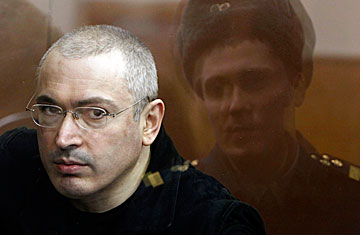
Russia's jailed former oil tycoon Mikhail Khodorkovsky attends a court session in Moscow on April 5, 2010

This post is in partnership with Worldcrunch, a new global-news site that translates stories of note in foreign languages into English. The article below was originally published in Kommersant.
MOSCOW — A German film about imprisoned Russian oil tycoon Mikhail Khodorkovsky is set for release in Russia next week, but it is unlikely that many in the country will actually have an opportunity to see it. That's because most Russian theaters have declined to screen Khodorkovsky, as the documentary is titled. In Moscow, only one movie house has agreed to show the film, which tells the story of the former Yukos Oil owner arrested in 2003 on charges of fraud.
"When we acquired the rights to the film in September 2011, we held discussions with many theaters and chains, and got several preliminary agreements for release," said Olga Papernaya, the art director of the company promoting the film in Russia. "But when it came time to sign an agreement, we ran up against refusals. They are all oral refusals, so we can only guess what is really behind it."
According to Papernaya, the first cinema network to refuse to show the film was Moskino, a group owned by the city government of Moscow. Then another theater decided to show the documentary only once, on Dec. 2. Papernaya says that after these refusals, there was a "chain reaction," with a total of 19 refusals. "It seems like there was a decision made at some point by theater managers and owners, and it seems like that was connected to calls from government officials," she said.
The movie theaters in St. Petersburg also refused, as did those in Novosibirsk, where Khodorkovsky was arrested in 2003 and where the film's director — Cyril Tuschi of Germany — had hoped to appear for the premier. The film was first unveiled this past February during the Berlin Film Festival.
The documentary was shot from 2005 to '11, although both the Russian government and many of Khodorkovsky's partisans refused to cooperate with the project, thinking that the main character was portrayed as being too controversial. There were also constant problems with sponsors. Filming took place in Moscow, St. Petersburg, Chita in Russia, Strasbourg in France, New York City, Tel Aviv and London — all cities that were connected in some way to the Yukos affair. The film contains many high-profile interviews, including with Khodorkovsky and members of his family.
A Professional Break-In
The documentary was finished in time for the Berlin Film Festival, but five days before the festival opened, the production company's office was broken into and the final version of the film was stolen. German authorities described it as a very professional break-in. Luckily Tuschi had other copies of the final cut, and the film was shown at the festival as planned. Berlin police never found the thieves.
Nobody from Moskino would comment for this article. Sergei Kapkov, head of the culture department of Moscow's city government, said, "I have no idea why this film is not being shown. But in terms of some kind of prohibition, I can tell you that city workers do not have that kind of leverage over what is shown in private movie theaters."
Another movie theater owner said his chain decided to pass up the film simply because it does not show documentaries. Papernaya is not convinced.
"Especially since parliamentary elections are approaching, I think this will become an international scandal. The European press is following the fate of Cyril Tuschi's film," she said. "On its own, though, the film can't change the political situation. It contains only well-known facts. But it's possible the real reason for the refusals is that showing the film on the big screen has a much larger emotional impact than several small articles in the media."
Also from Worldcrunch:
How Assad's Fall in Syria Could Overturn the Middle East Chessboard
— Le Monde
Top 10 Reasons Why the Euro Was a Dumb Idea
— Die Welt
How Germans Learned to Stop Worrying and Love Google Street View
— Süddeutsche Zeitung
